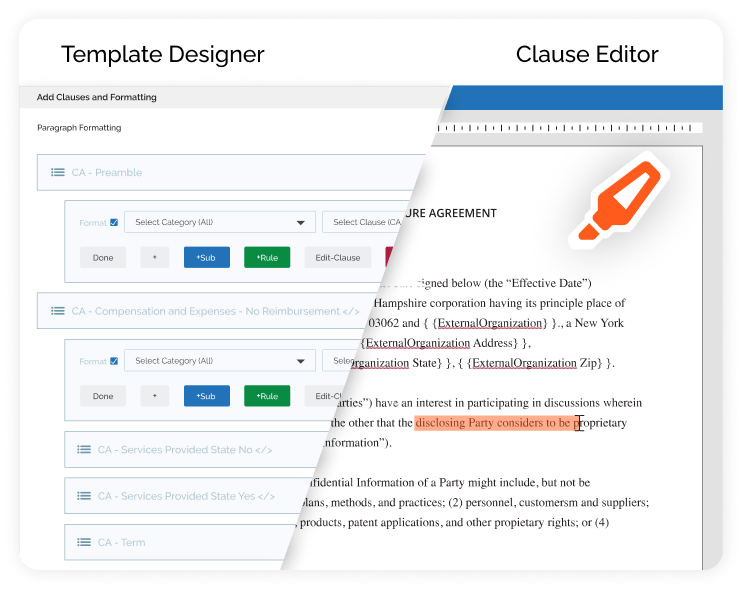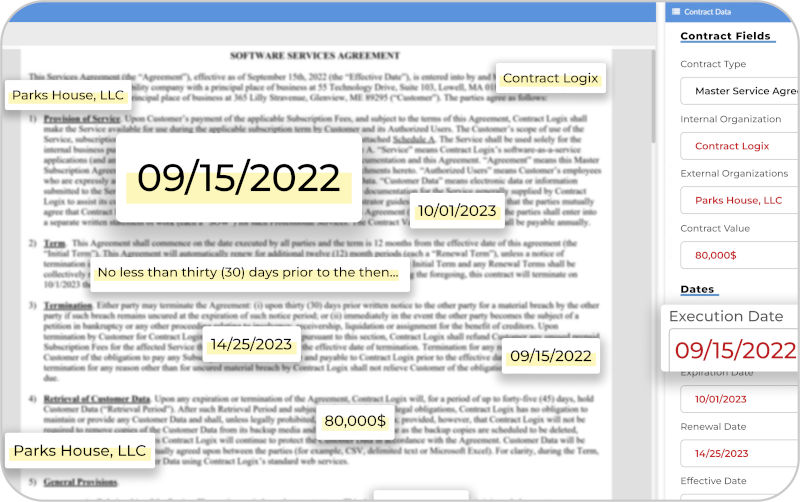What Is a Contract Management System (CMS) and How Does It Work?
Managing contracts is one of the most critical functions in business. Every agreement carries obligations, deadlines, and risk. Yet many organizations still rely on manual processes, email threads, and shared drives to oversee their contracts. This approach creates inefficiencies, increases exposure, and makes it difficult to access accurate information when it is needed most.
A contract management system (CMS) solves these challenges by centralizing, automating, and streamlining the contract lifecycle. From authoring and negotiation to execution and renewal, a CMS helps organizations manage every step in a structured, secure, and transparent way. This article explains what a contract management system is, how it works, and why it has become an essential tool for businesses in every industry.
Quick Takeaways
- A contract management system (CMS) centralizes all contracts in a secure, searchable repository.
- It automates contract workflows, including authoring, approvals, signatures, and renewals.
- Key features include templates, clause libraries, audit trails, reporting, and integrations.
- Benefits include improved compliance, faster cycle times, reduced risk, and stronger visibility.
- A CMS supports digital transformation by modernizing how organizations manage agreements.
Ready to see how a CMS can transform your business? Learn more in The Complete Business Guide to the 8 Phases of CLM. Download the guide here.
Defining a Contract Management System (CMS) and Its Role in Business
A contract management system (CMS) is software designed to handle the entire lifecycle of contracts. It consolidates every agreement into one repository and provides tools for creation, negotiation, execution, and renewal. Instead of scattered documents across email and shared drives, businesses gain a single source of truth for all contract data.
By using a CMS, organizations can standardize processes and ensure contracts follow consistent formats, terms, and approval workflows. This consistency reduces errors, strengthens compliance, and accelerates contract completion. A CMS is not limited to legal teams; procurement, sales, finance, and operations also benefit from streamlined contract access and oversight. In fact, a CMS often forms the foundation for broader contract lifecycle management (CLM) initiatives that span the entire journey from request to renewal.
How a Contract Management System (CMS) Works, Step-by-Step
A CMS brings order to a process that has traditionally been fragmented. While each platform may offer different functionality, most systems follow a similar approach:
1. Centralized Repository
All contracts are stored in a secure, digital repository. Users can search and filter by contract type, counterparty, date, or custom fields. This eliminates the risk of lost or misplaced agreements and ensures documents remain accessible across departments.
2. Authoring and Templates

CMS platforms provide templates and clause libraries so teams can draft contracts faster and with fewer errors. Standardized language supports compliance with corporate policies and reduces the risk of inconsistent terms.
3. Workflow Automation
Automated workflows and contract automation tools route contracts through the correct approval channels. Notifications and alerts keep tasks on schedule, while role-based permissions control access and protect sensitive data.
4. Collaboration and Negotiation
Internal teams and external counterparties can review, redline, and comment in real time. Version control ensures everyone works on the latest document and tracks changes for full transparency.
5. Execution and Signatures
CMS tools integrate with electronic signature providers to accelerate execution. Once signed, contracts are automatically stored in the repository with a complete audit trail.
6. Post-Execution Management
Reminders and alerts notify stakeholders of key dates such as renewals, expirations, and obligations. This ensures contracts are actively managed rather than forgotten once signed.
Core Technologies and Benefits of a Contract Management System (CMS)
Modern contract management systems do more than store documents—they transform how organizations manage risk, collaboration, and data. Today’s CMS platforms combine automation, analytics, and AI to turn contracts from static records into actionable business intelligence.
1. Artificial Intelligence (AI) and Data Extraction
AI-powered data extraction automatically identifies key information such as parties, dates, values, and renewal terms from every contract. Instead of manually entering data, users gain structured fields that feed directly into reports and workflows.
Business value:
- Eliminates manual entry errors and accelerates onboarding of legacy contracts.
- Enhances visibility into obligations and risk by making data searchable and reportable.
- Supports analytics that help teams forecast renewals, revenue, and supplier performance.
2. Dashboards and Analytics
Dashboards give stakeholders real-time visibility into contract health, cycle times, and workload distribution. Visual analytics highlight bottlenecks and opportunities for improvement.
Business value:
- Provides executives with actionable insights into risk exposure, contract value, and performance trends.
- Enables legal, procurement, and sales teams to prioritize tasks and measure KPIs.
- Strengthens governance by turning contract data into a management tool, not just an archive.
3. Workflow Automation and Alerts
A CMS automates routine steps like approvals, signatures, and reminders. Built-in alerts ensure no contract misses a critical milestone, while audit trails record every action for accountability.
Business value:
- Reduces administrative time and speeds up contract cycles.
- Improves compliance with internal policies and regulatory timelines.
- Ensures consistent enforcement of terms across departments.
4. Integrations and System Connectivity
Seamless integrations with CRM, ERP, and eSignature platforms allow contract data to flow freely between systems. When a deal closes in CRM, or a vendor is approved in ERP, contract records update automatically.
Business value:
- Eliminates data silos and keeps teams aligned across business functions.
- Improves accuracy by synchronizing customer, vendor, and financial data.
- Supports enterprise-wide digital transformation through unified contract visibility.
5. Security and Compliance Management
Advanced CMS platforms include granular permission controls, encryption, and audit trails to protect sensitive information and support compliance frameworks.
Business value:
- Reduces the risk of unauthorized access and data breaches.
- Simplifies audits with complete visibility into contract activity.
- Helps organizations meet evolving industry and regulatory standards.
6. Continuous Optimization Through COaaS
When supported by a Contract Operations as a Service (COaaS) model, CMS technology remains accurate, optimized, and aligned with evolving business goals.
Business value:
- Ensures the system grows with the organization.
- Provides proactive updates to templates, workflows, and permissions.
- Maximizes return on investment through ongoing performance monitoring.
These technologies turn contract management from a document storage function into a strategic business enabler. By combining automation, intelligence, and integration, a CMS helps organizations control risk, uncover insights, and build stronger commercial relationships.
Top Business Benefits of Using a Contract Management System (CMS)
Improved Compliance
A CMS ensures that every contract follows approved templates, clauses, and workflows. Audit trails and reporting provide transparency, helping organizations meet regulatory requirements and internal policies.
Faster Cycle Times
Automated workflows, templates, and e-signatures reduce delays in contract creation and execution. Faster cycle times mean sales close sooner and procurement secures value more quickly.
Reduced Risk
By tracking obligations, deadlines, and renewals, a CMS prevents missed commitments and reduces exposure. Security features protect sensitive data while maintaining full visibility.
Stronger Visibility and Control
Centralized data allows leadership to monitor the health of the contract portfolio. Dashboards and analytics support better decision-making and more accurate forecasting.
Efficiency Across Departments
Sales, procurement, finance, and legal gain consistent access to contract data, reducing duplication and streamlining collaboration. This efficiency frees teams to focus on strategic initiatives rather than administrative tasks.
Contracts represent the foundation of every business relationship. Managing them effectively is critical to ensuring compliance, minimizing risk, and improving performance. A contract management system (CMS) provides the structure, automation, and visibility organizations need to modernize this essential process.
FAQ
Q: What is a contract management system (CMS)?
A: A contract management system (CMS) is software that helps businesses create, store, track, and manage contracts throughout their lifecycle, improving efficiency and compliance.
Q: What does a contract management system do?
A: A CMS automates workflows, stores contracts in a centralized repository, and provides alerts for renewals, expirations, and key obligations.
Q: Why is a contract management system important?
A: It reduces manual errors, speeds up approvals, ensures compliance, and provides full visibility into every agreement.
Q: How does a CMS support digital transformation?
A: By digitizing contracts and automating processes, a CMS helps organizations modernize operations, reduce risk, and improve governance.
Drive Digital Transformation Today with Contract Logix
By adopting a CMS, businesses create a single source of truth for agreements, accelerate contract cycles, and gain the insights needed to drive strategy. For organizations seeking to digitize operations and improve governance, adopting digital contract management through a CMS is a powerful step toward achieving digital transformation.
Ready to see how Contract Logix’s contract management system helps you reduce risk, improve compliance, and accelerate contracts? Schedule a demo today to discover how Contract Logix COaaS model streamlines contract operations and drives digital transformation.
Navigate CLM Success With Contract Logix
Download our Data Extraction Product Brief to learn how you can begin to navigate CLM success by automating the hard work using artificial intelligence with one of the best Contract Management Software’s on the market today



